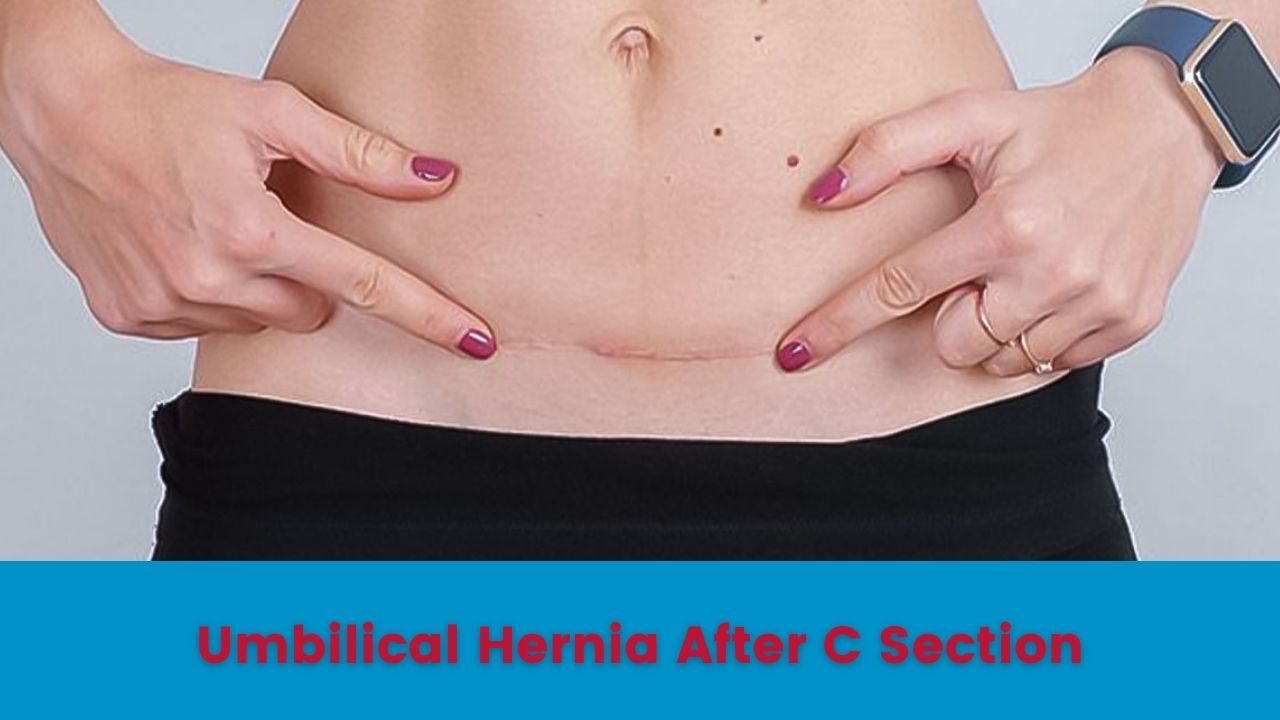Home > Blogs > General Surgery > Everything You Need to Know About Umbilical Hernia After C Section
Everything You Need to Know About Umbilical Hernia After C Section

Umbilical hernia or postpartum hernia is a condition that can develop among women who had a C-section delivery. However, there are several reasons why a doctor recommends a cesarean delivery. An umbilical hernia is becoming very common and complicated because people are not much aware of such a condition.
A study published in a journal named PLOS ONE points out that every 2 out of 1,000 women tend to develop postpartum/umbilical hernia which requires a surgical repair.
What is an umbilical hernia after C-section?
A hernia is a condition that occurs when a part of the body pushes through another part and protrudes into it. During a C-section, a surgical cut is made upon the abdomen and uterus which makes the abdominal wall weak. In such a case hernia can very well occur when the stomach or the intestine pushes through this weak area leading to a bulge.
When can women be at risk to develop an umbilical hernia?
There can be several reasons why a woman after a C-section can develop an umbilical hernia.
- Women who had a large cesarean cut.
- Obese women.
- Diabetic women.
Expert doctors opine that among some women, the spot where the umbilical cord is detached after child delivery never heals completely. As a result, there remains a tiny hole in the abdomen or the tissue behind the navel. As there is a weakness over that tissue, the accumulation in the belly fat can be the prompt reason to develop a postpartum hernia.
Symptoms of Umbilical hernia after C-section
Some women can develop hernia just after the C-Section within a year, however, in some women, the symptom takes much longer to appear. A hernia occurring in the abdomen can be a risk factor as it can get tangled. Therefore, women must look for symptoms of umbilical hernia if they had a C-section.
- Abdominal bulge
This is the most common symptom which occurs at the initial stage. Women can find a bulge of tissue from the scar of the C-section. If a woman stands tall and straight, this bulge can be felt in the abdomen area. It is even while coughing or doing physical exercise when women can feel such a bulge in the abdomen.
- Pain
This is the next symptom of hernia among women after a C-section. However, it is sometimes difficult to trace the actual reason for pain as women after a C-section can have abdominal pain for a few weeks because of the large surgical cut. In such cases, it becomes difficult to recognize the reason. Therefore if you have just delivered and are still experiencing pain for months, you must visit your doctor.
- Nausea and vomiting.
As an umbilical hernia develops around the abdomen, it can cause stomach upset. Constipation, vomiting, and nausea can also be some of the recognizable symptoms.
There are cases when the umbilical hernia can get complicated and constricted. In such a case, the herniated tissues develop a tendency to get trapped and become a strangulated hernia. Such a phenomenon can be very risky as it can cut off the blood supply to the organs in the stomach.
The symptoms of a strangulated hernia are mostly the same.
- Slow and intensifying pain in the abdomen.
- Nausea and vomiting.
- Redness and swelling of the stomach.
Have queries or concern ?
How can doctors diagnose an umbilical hernia after C-section?
A doctor can easily diagnose an umbilical hernia just by looking at the appearance of the stomach. However, for the correct diagnoses, doctors mostly advise for a USG scan. In some cases, a CT scan is also done to check the condition.
However, other conditions have a similar symptom of hernia. Therefore, it is the doctor who will verify the actual cause. Some of the conditions with the same symptoms are-
- Hematoma.
- Abscess.
- Uterine rupture.
- Abdominal wall endometriosis.
- A wound infection.
How quickly do women recover after an Umbilical hernia?
If the umbilical hernia is not very large, women can start walking from the same day of the surgery. However, in some cases, bed rest for a week or two is recommended. In some cases, hernia repair is done simultaneously with a C-section. In such cases, recovery may take a little longer and you have to be under your doctor’s supervision.
Risks and complications
Although it is safe, it can have some risks.
- Anesthetic effects.
- Blood clots.
- Hematoma.
- Seroma
- Bleeding.
- Perforated Bowels.
Umbilical hernia after a C-section is a rare phenomenon but you can be a victim of it. It is the reason why doctors advise certain exercises during pregnancy. If you are someone experiencing any symptom of discomfort in the abdomen after your C-section, you must consult a doctor.
Patient Feedback
Great doctors, Good facilities, caring and helping staff. I recommend this hospital for day care services.
![]()
![]()
Sangram Shinde
All doctors r very good. There treatments is best. Other staff also good. The service of nurses is great...Hospital is always clean.
![]()
![]()
Vaishali Aitawade
All services provide by hospital are nice and on time. Doctors are polite and co-operative with patient.
![]()
![]()
Ankita Jagtap
All services provided by hospital is good. Hygiene maintained well.Even at night good care provided.
![]()
![]()


